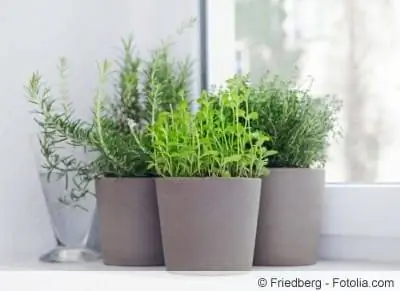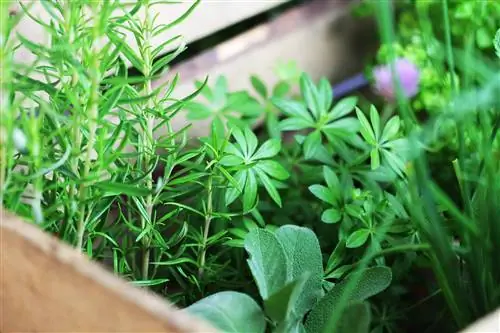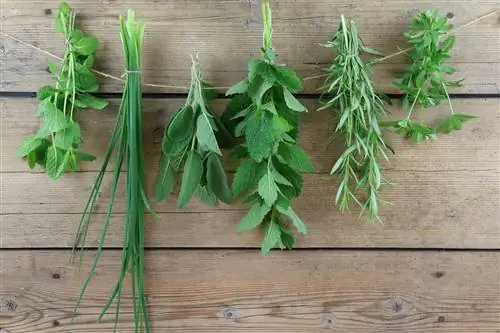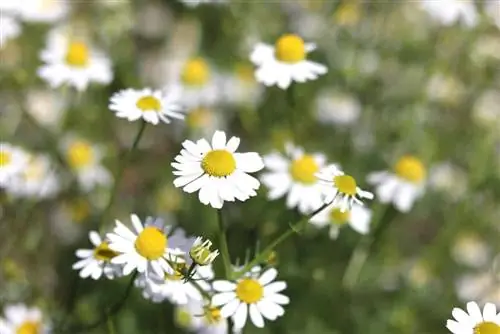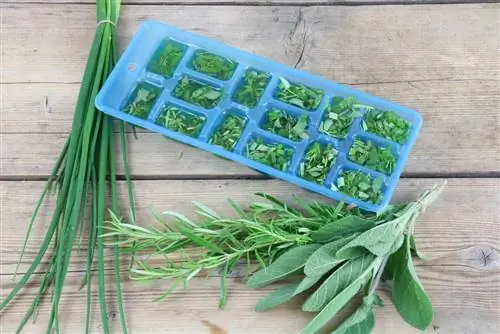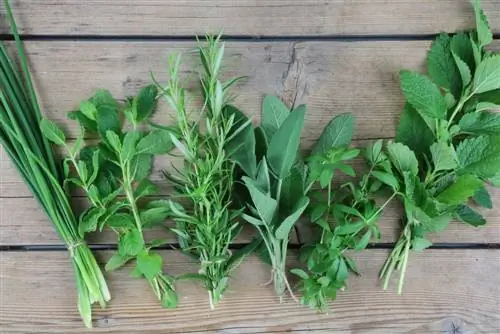- Author admin [email protected].
- Public 2023-12-17 03:39.
- Last modified 2025-01-24 12:45.
Fresh herbs refine the menu with a spicy flavor and also have many he alth-promoting properties. However, there is not always a garden available for planting, and there is a forced winter break in the cold season. In these cases, it is advisable to grow herbs and spices in the home and/or kitchen and harvest them immediately if necessary. In this way, the hobby cook has fresh herbs available for cooking all year round.
Location & plant substrate
Cultivating herbs on a windowsill allows you to harvest fresh herbs for the kitchen, without seasonal restrictions. The sun, the incidence of light, the constant room temperatures and the absence of the onset of winter guarantee continuous herb growth in living spaces. This way, no one has to resort to dried and frozen herbs in the cold winter, but can use freshly harvested and home-grown herbs to flavor their favorite dishes. If there is a pet in the household that likes to play with plants and herbs, then a higher location should be chosen that the animal cannot reach. The following aspects must be taken into account when considering the location and the planting substrate:
- Sort herbs according to location requirements and soil quality
- Choose suitable planters
- Create drainage under the planting substrate to improve permeability
- For poor soil conditions, mix the soil with a little sand
- Cactus soil can also be used as an alternative
- For nutrient-rich soils, use rich compost or potting soil
- Sun-drenched herbs need a south-facing windowsill
- Mount or hang at height for strong sunlight
- Scout out partially shaded places, observe the incidence of light during the day
- When planting in groups, pay attention to herbs with similar requirements
Suitable herbs
Fresh herbs still taste best; in contrast to frozen commercial products, they have a much more intense aroma. Of course, most native herbs thrive much better in the garden bed than on the windowsill in the living room. But there are also some southern herbs that do not tolerate the local winters well because they come from warmer climes. These sensitive and non-frost-hardy types of herbs are better off on the windowsill. Basically, almost all common types of herbs can be used for planting on the windowsill:
- Pay attention to relatively undemanding and easy-care herbs
- Water-loving Mediterranean herbs are ideal for the windowsill: oregano, rosemary and thyme
- Also suitable: basil, nasturtium, chervil, bay leaf and lemon balm
- Wild garlic and peppermint are particularly strong growers
- Parsley grows slowly
- Chives and mint need cool and shady places
- Always pay attention to the growth height of the variety and the appropriate space available
Planter
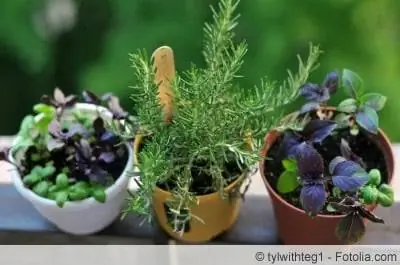
Ideally, the various types of herbs are placed in individual planters so that they can develop undisturbed. In this case it is also easier to meet the different requirements for light incidence and floor quality. If you want to try something new, you can use individual herb easels, which are placed on the windowsill. Herb garlands that hang directly from the window and can be filled with several small pots at the same time are also unusual:
- Choose planters large enough for the respective type of herb
- Balcony boxes, flower pots, hanging baskets, tubs and planters are ideal
- Use suitable coasters to prevent harmful puddles of water from forming
- Minimum size of the container for individual plantings: diameter of 14-20 cm
- Natural terracotta pots and colorfully painted ceramic vessels are very attractive
- Vessels can be adapted to the respective room decoration
Tip:
If the design of standard planters is too boring for you, you can use rustic baskets as planters.
Temperature, humidity & light requirements
If the lighting conditions in the apartment are rather dark, then this factor must be taken into account when purchasing herbs. In this case, herb varieties that require little light and are ideal for darker rooms and window sills are appropriate. To ensure that the herbs always feel comfortable in the home or kitchen, the temperature must not fall below certain values. Temperatures that are too high are also harmful, which is why the herbs must not be placed directly above the heater, on the oven or next to the stove. Not only the window sills in the kitchen are suitable for overwintering, but also in unheated bedrooms and guest rooms. In addition, many herbs require higher humidity than normal room air can have. In this case, the air humidity in the room must be permanently increased. The following criteria are crucial when it comes to temperatures, humidity and light requirements:
- Ideal room temperatures are at least 18° C on average
- Partum shade-loving herbs are added to the east window and west window
- Place herbs that like it cool and shady on the north window
- South windows are ideal for sun-hungry herbs
- Chives and parsley are good for dark rooms
- Increase low humidity in the room with additional water pots or trays
- Place a tray with moistened pebbles near the herbs
- In winter, pay attention to a frost-free, cool and bright location
- The exception is basil, the heat-loving herb needs temperatures of 24-30° C
- Move herbs to balconies and terraces during the warm months
Tip:
In order to increase the amount of light at the required time of day, you can use a special grow lamp that is equipped with a timer.
Watering & Fertilizing
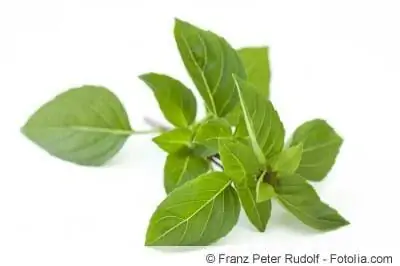
In contrast to the herb garden, indoor herbs do not receive any rainwater, so they are completely dependent on additional watering processes. Although most herbs do not need excessive watering, they do not cope well with long-term drought. If you have to travel frequently and watering sessions cannot be carried out regularly during this time, then ideally you should grow herbs that can survive with little water and prolonged drought. Chemical fertilizers should be avoided completely, as they distort the taste and are harmful to he alth. Many of the herb varieties are also relatively undemanding when it comes to fertilizing:
- Water regularly but sparingly
- Too much water and waterlogging causes herbs to rot quickly
- Drainage prevents overwatering
- Small shards of clay that are mixed into the plant soil are ideal
- Apply fertilizer once or twice a year
- Compost fertilization or other organic fertilizers are optimal
- Fertilize either in spring and/or autumn
Harvest
Harvesting is possible all year round, but most herbs grow slower in winter, so harvesting should be more careful during this time. Fast-growing plants should be checked regularly and harvested more heavily if they grow profusely. The following procedure has proven successful during harvesting:
- Either carefully pluck out the leaves of the herbs or cut them off with kitchen scissors
- Always take the leaves on the bottom first
- Do not pluck the basil leaves individually, but cut them off at the stem
- Never cut off more than half to ensure continued growth
- Plants that are already weak should be allowed to recover before the next harvest
Pests & Diseases
Unfortunately, even the herbs on the windowsill are not safe from diseases and pests; they are often attacked by small flies and lice. The causes often include excessive humidity in the kitchen, excessive watering and rot spreading in the rootstock. Therefore, when kept indoors, the herb plants should only be watered when necessary and, if necessary, completely disposed of if there are severe flies and lice infestations:
- Use pouring units moderately, especially with Mediterranean herbs
- If you have lice, shower herbs well and then let them dry
- Repeat the procedure several times if the infestation is stubborn
- Instead of normal water, put soap solution in spray bottle
- Spray the entire plant, including the underside of the leaves
Conclusion
Herbs can also be easily planted in your home and harvested quickly and easily when necessary. Herb plants thrive particularly well on a windowsill with sufficient light; sunny places in the kitchen are ideal. Since the water and nutrient supply via rainwater and the soil is completely eliminated when growing indoors, these factors must be taken into account in the care effort. As a rule, herbs are sold in small pots in specialist shops; in this case, they should be transplanted into larger containers. In general, almost all known herbs can be planted on the windowsill at home, but the location requirements must be taken into account before purchasing. Regular watering and the use of organic fertilizer support a rich harvest and enable you to prepare food and drinks with fresh and delicious herbs all year round.

